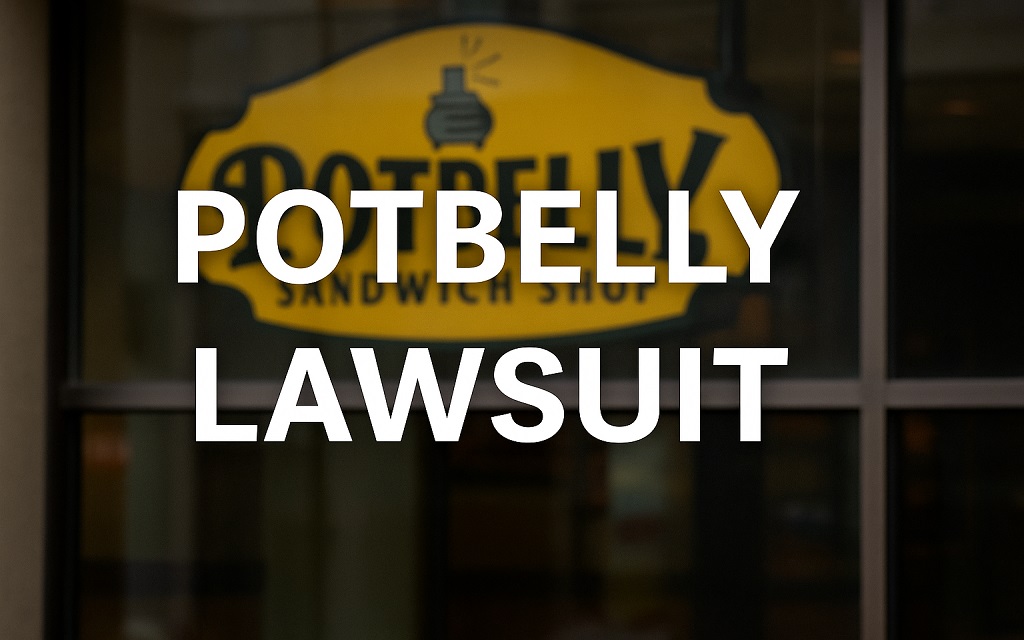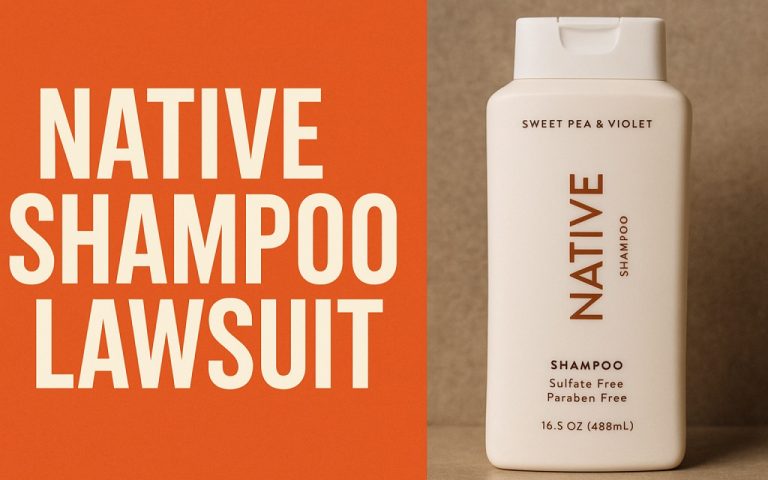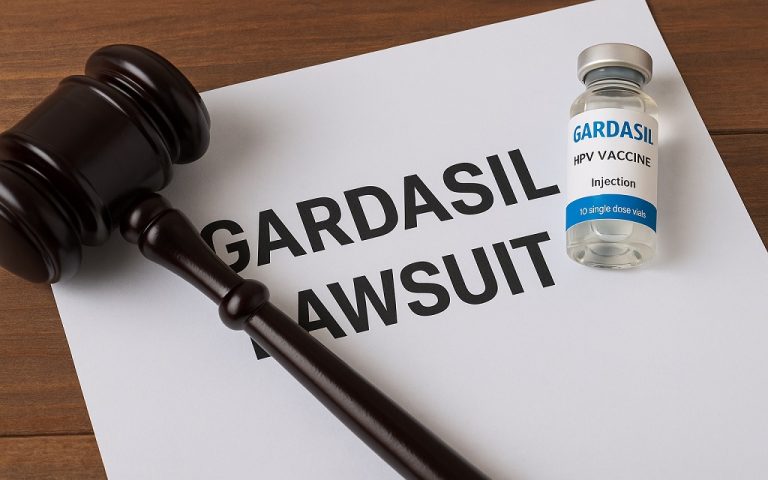Last Updated: 22 October 2025
You should know that the Potbelly Lawsuit has become a significant case in Washington. The lawsuit accuses Potbelly of posting job ads without required wage details. Plaintiffs argue that the company broke state pay-transparency rules. The Potbelly Lawsuit focuses on postings that left out salary ranges and benefits. Applicants say they wasted valuable time applying without clear pay information.
It is essential to know why the case matters. The Potbelly Lawsuit reflects a growing trend of class actions targeting employers who ignore wage disclosure laws. More applicants and attorneys across the United States now monitor job ads closely. A report from Bloomberg Law shows that more than 25 cases have been filed in Washington since the law took effect in January 2023. If you applied for a Potbelly job in Washington, you may qualify for compensation under the settlement.
You may ask why this lawsuit draws so much attention. The answer is simple. Pay transparency affects everyone looking for fair work. Employers must follow rules, and failure can lead to millions in damages. The Potbelly Lawsuit shows how strongly courts enforce transparency standards.
Key Points
A proposed class settlement worth up to $2.71 million has been reached in Jones et al. v. Potbelly Sandwich Works, LLC, et al. over alleged pay transparency violations in Washington job postings. According to the settlement administrator (ILYM Group), the claim deadline was August 4, 2025, and the final approval hearing is October 10, 2025. If you applied to Potbelly or its Washington franchisee on or after Nov 13, 2023 and the posting did not list wage/salary range and benefits, you may be in the class once the court approves the settlement.
What is the Potbelly lawsuit about?
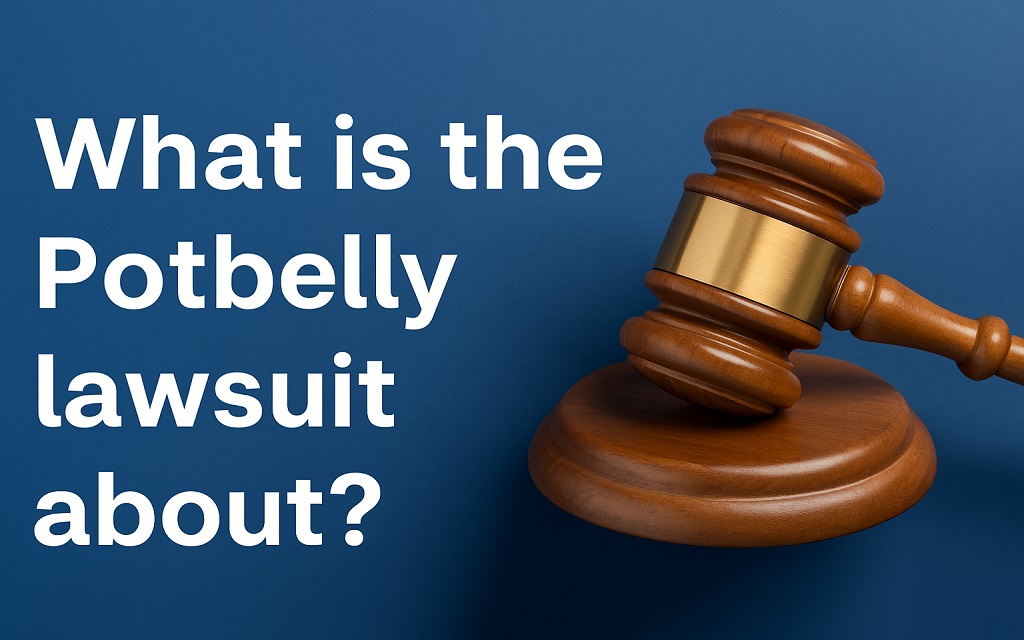
You should know that the Potbelly lawsuit centers on pay transparency violations in Washington. The case accuses Potbelly Sandwich Works, LLC, and Sound Sandwich, LLC of ignoring state law. The companies, according to the plaintiffs, did not disclose pay and perks in their employment advertisements. RCW 49.58.110, which is a component of Washington’s Equal Pay and Opportunities Act (EPOA), is the relevant law.
It is essential to be aware that this law mandates that companies with fifteen or more workers provide certain information in their job postings. A wage scale or salary range must be disclosed by employers. They must describe benefits such as health coverage or retirement contributions. They must also mention other compensation, such as bonuses or commissions. According to the complaint, Potbelly’s job postings were “silent as to compensation.”
You should understand that the lawsuit began after two applicants in Washington applied for Potbelly positions. One applied in July 2023. Another was used in May 2024. Both argued that the job postings lacked any mention of pay. As a result, they claim they wasted valuable time applying for roles without the ability to judge compensation.
Statistics support the importance of the case. Salary transparency can reduce gender pay disparities by as much as 40%, according to research from the National Women’s Law Center. When lawmakers in Washington adopted stronger transparency regulations, they cited similar evidence. The plaintiffs argue that Potbelly’s failure undermined these goals and harmed job seekers across the state.
Additionally, you should be aware that the complaint is in the Western District of Washington and is filed as a proposed class action. All applicants who applied for Potbelly jobs in Washington after Nov 13, 2023, when job advertising lacked wage information, are to be represented by the plaintiffs. Since the transparency law went into effect at the beginning of 2023, the date is significant.
Legal experts consider the Potbelly case part of a wider pattern. According to Bloomberg Law, more than two dozen lawsuits have been filed in Washington alone under RCW 49.58.110. Employers across industries face similar claims. The Potbelly lawsuit, therefore, represents more than one company’s problem. It reflects a trend in employment law toward full disclosure of pay information.
You now know the central issue. The Potbelly lawsuit is about compliance with pay transparency laws and about protecting job applicants. The case shows how failure to disclose salary details can expose employers to multimillion-dollar claims.
Why did Washington pass RCW 49.58.110 on pay transparency?
You should be aware that Washington politicians passed RCW 49.58.110 to improve labor market fairness. The Equal Pay and Opportunities Act (EPOA) includes the law. Lawmakers contended that an excessive number of candidates applied for jobs without knowing the fundamentals of compensation. The lack of transparency reinforced wage gaps and wasted time for workers.
It is essential to recognize that wage inequality was a key factor driving the law. In Washington, women make about 82 cents for every dollar earned by men, according to data from the U.S. Census Bureau. Lawmakers referenced a National Bureau of Economic Research study that found pay transparency can close these disparities by as much as 20%. You should understand that transparency was seen as a tool to close long-standing inequality.
You should also recognize the practical motivation. Many applicants spend hours applying for roles only to discover that the pay falls below their expectations. According to a Glassdoor survey, more than 67 percent of job seekers say pay is the most critical factor in evaluating an offer. By mandating disclosure, Washington reduced wasted time and gave applicants the ability to compare roles more effectively.
Another reason comes from fairness in negotiations. Employers often held the advantage in salary discussions. Applicants had little information to use as leverage. Studies from the Society for Human Resource Management (SHRM) found that employees who know pay ranges are 25 percent more confident in negotiations. Lawmakers wanted to level that playing field.
You should note the economic argument as well. Transparent postings create stronger competition among employers. If one company hides pay details while another advertises clear ranges, job seekers prefer the transparent employer. Transparency pressures companies to offer competitive wages and benefits. That outcome benefits workers and stabilizes markets.
You now see the broader intent. Washington passed RCW 49.58.110 to combat wage gaps, reduce time wastage, and empower job seekers. The law reflects a nationwide movement. States such as California, Colorado, and New York adopted similar requirements. The Potbelly lawsuit demonstrates how Washington intends to enforce compliance when employers ignore the rules.
How did job postings by Potbelly fail to meet the law?
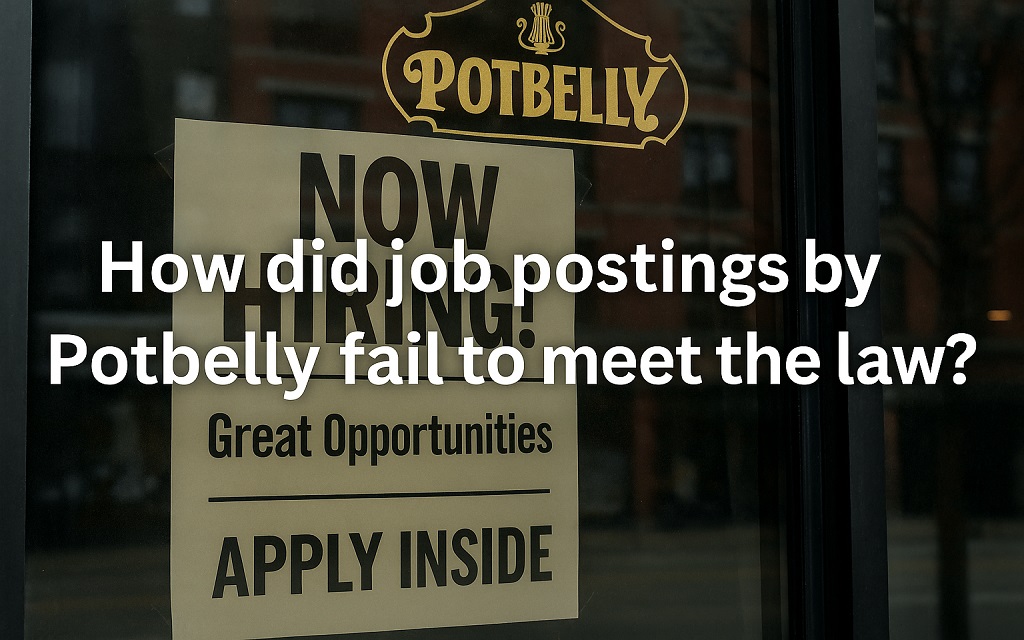
You should know that the lawsuit claims Potbelly’s job postings broke Washington’s transparency law. The complaint states that Potbelly Sandwich Works, LLC, and Sound Sandwich, LLC, posted ads that lacked salary details. Applicants say they saw no wage scale, no salary range, and no benefits description. The ads were “silent as to compensation,” according to court filings.
It is essential to know that RCW 49.58.110 requires three key disclosures. Employers must include a wage scale or a salary range. They must describe benefits such as medical insurance, retirement contributions, or paid leave. They must also mention any extra compensation, such as bonuses or commissions. The plaintiffs argue that Potbelly postings included none of these.
You should consider how this affected applicants. The named plaintiffs applied in July 2023 and May 2024. Both claim they wasted time submitting applications without knowing the pay. They could not compare Potbelly’s offer against other employers. They also lost negotiation power because they lacked a starting reference point. Statistics support their argument. A 2022 LinkedIn survey found that 61 percent of applicants decline offers when salary details are unclear.
You should also recognize that the violation was not a single mistake. The complaint highlights multiple postings across different months. The pattern suggests ongoing non-compliance after January 2023, when the law took effect. Legal experts argue that repeated failures strengthen the plaintiffs’ case. A single error may be excused, but a series of omissions points to systemic disregard.
You should note that Potbelly is not the only company facing such claims. Reports from Bloomberg Law confirm that dozens of Washington employers face similar lawsuits. Courts will decide each case based on evidence, but the legal risk is clear. A company that fails to include wage information in postings opens itself to class actions and potential multimillion-dollar settlements.
You now understand why the Potbelly postings are at the center of this dispute. The ads allegedly lacked all required pay details. Applicants say they lost time, lost bargaining power, and lost fair access to information. The law exists to prevent such harm. The lawsuit will test how strictly courts enforce Washington’s pay-transparency mandate.
Who qualifies to join the Potbelly class action?

Please note that not all applicants are eligible for the Potbelly class action. Courts define a class carefully. The complaint sets clear boundaries on who is included. The proposed class focuses on job applicants in Washington who encountered job postings lacking required pay details.
It is essential to know the specific requirements. You may qualify if you applied for a Potbelly Sandwich Works, LLC or Sound Sandwich, LLC job in Washington. The application must have occurred on or after Nov 13, 2023. The posting must have lacked a wage scale or salary range. The posting must also have excluded a description of benefits or other compensation.
You should also know who does not qualify. Applicants outside Washington are omitted. Applicants who applied before Nov 13, 2023, are not covered. Additionally, applicants who saw compliant postings with pay ranges and benefits do not fall within the class. Statistics from the Washington Department of Labor & Industries show that more than 50,000 job postings in 2023 included wage details. Potbelly applicants who saw compliant ads form part of that group and are excluded from this lawsuit.
You should consider why the date matters. January 1, 2023, marks the start of the enforcement period for RCW 49.58.110. Lawmakers gave employers time to prepare. From that date forward, every posting had to comply. Courts will only recognize claims tied to postings after that deadline.
You should also note how broad the class could be. Potbelly has multiple stores across Washington, including Seattle, Tacoma, and Spokane. If each location posted ads without pay details, hundreds or even thousands of applicants could fall within the class. Experts from SHRM note that class actions of this type often involve thousands of claimants because job applications are frequent and widespread.
You now see the scope. The class includes Washington applicants after Nov 13, 2023, who applied to postings without wage scales, salary ranges, or benefits descriptions. If you fall within this group, you may qualify for compensation once the settlement receives court approval.
How much compensation can applicants expect?
You should know that the Potbelly settlement creates a fund valued at up to $2.7 million. That figure comes from reports shared during settlement discussions. The fund will be divided among applicants, attorneys, and administrators once the court approves.
It is essential to know how the money will be split. Courts usually approve deductions for attorney fees and administrative costs. Attorney fees in class actions often range from 25 to 33 percent of the fund. The administrator also receives payment for processing claims and distributing checks. After these deductions, the remainder goes to eligible applicants.
You should also understand how your individual payout depends on participation. If thousands of applicants file claims, each payout will be smaller. If fewer people participate, individual payments rise. For example, if 10,000 applicants file valid claims, and $1.8 million remains after deductions, each claimant may receive around $180. If 3,000 applicants file, the payout could rise to about $600 each.
You should also consider the statutory background. Washington law initially allowed applicants to seek $5,000 in damages per violation, plus attorney fees. That number represented the maximum risk for employers. In practice, settlements often provide lower payouts. Courts prefer a broad distribution of funds rather than maximum damages for each person. Statistics from Bloomberg Law confirm that most pay-transparency settlements in Washington result in payouts ranging from $150 to $700 per applicant.
You should also note tax implications. Settlement payments are generally taxable income. Administrators may issue IRS Form 1099 for larger payments. Applicants should consult tax advisors to confirm their individual obligations.
You should also consider the broader point. Compensation reflects more than money lost. It acknowledges wasted time, lost opportunities, and unfair hiring practices. Lawmakers designed RCW 49.58.110 to protect applicants from such harm. The Potbelly settlement ensures that affected workers receive recognition for the disadvantage they faced.
You now know what to expect. The settlement fund will not make anyone rich. However, it will provide meaningful compensation and reinforce the principle that transparency in job postings is not optional.
What steps should you follow to file a settlement claim?

You should know that filing a claim is the only way to receive money from the Potbelly settlement. Courts require a formal process. The settlement administrator, ILYM Group, manages the claims. The administrator ensures that each applicant files correctly and receives payment after approval.
It is essential to know where to begin. You should start by visiting the official settlement website. The site contains the online claim form, the class notice, and instructions. It also provides deadlines for submission. The court requires that every claimant follow these deadlines strictly.
You should also prepare the required information before filing. Most claim forms ask for:
- Your full name and mailing address
- Your email and phone number
- The approximate date of your application
- The position title and location, if available
- Confirmation that the job posting lacked pay details
You should then complete the form online. The process usually takes only a few minutes. If you cannot file online, you may request a paper form from the administrator. You can fill out the paper form and mail it to the listed address. The form must be postmarked by the claim deadline.
You should note the importance of accuracy. Incorrect or incomplete claims may be rejected. Administrators verify applications against company records when possible. If your name appears in Potbelly’s hiring system, your claim may be confirmed automatically. If not, the administrator may contact you for clarification.
You should also know about deadlines. Courts generally allow 60 to 90 days from the date of class notice to file claims. Missing the deadline means no compensation. Statistics from the Federal Judicial Center show that more than 20 percent of class members often fail to file claims due to missed deadlines. You should avoid that mistake.
You should remember that filing a claim does not cost money. The process is free. The settlement fund covers administration. You do not need a lawyer to file. However, you may seek legal advice if you want additional guidance.
You now know the steps. Visit the website, review the notice, gather your details, and file your claim before the deadline. That process secures your share of the Potbelly settlement.
Who may qualify
You may qualify if you applied between Jan 1, 2023 and Nov 13, 2023 in Washington to a job posting by Potbelly Sandwich Works, LLC that did not include a wage/salary range and a general description of benefits/other compensation. You may be included in the settlement class if all of the following apply:
- You applied for a job with Potbelly Sandwich Works, LLC or Sound Sandwich, LLC (WA franchisee) in Washington State;
- The application was on or after Jan 1, 2023, to Nov 13, 2023; and
- The job posting did not disclose a wage scale or salary range, benefits, and/or other compensation (e.g., bonuses/commissions).
People who applied outside Washington, before Nov 13, 2023, or saw compliant postings are typically not in the class.
How do compliant job postings in Washington look?
You should know that Washington law sets clear rules for compliant job postings. RCW 49.58.110 requires every posting by an employer with fifteen or more workers to include three main details. Employers must list a wage scale or salary range. They must describe benefits. They must also identify other forms of compensation.
It is essential to know why details matter. A posting that says “competitive pay” or “great benefits” does not meet the law. Applicants must see numbers and specific perks. Courts use those elements to decide compliance. Statistics from the Washington Department of Labor & Industries show that more than 70 percent of employers updated postings in 2023 to include salary ranges.
You should consider examples to see the difference.
Non-compliant posting example:
- Now hiring team members
- Flexible hours
- Apply today
This example lacks a salary range. It does not mention benefits. It fails to show other compensation, such as bonuses. Applicants reading such a posting cannot judge whether to apply.
Compliant posting example:
- Hiring team members at $18 to $22 per hour
- Benefits include medical, dental, vision, and 401(k)
- Employees may qualify for quarterly bonuses
This example satisfies the law. It gives a clear wage range. It describes benefits. Also, it identifies extra compensation. Applicants can now compare offers and save time.
You should also know that compliance applies to internal promotions. If an employer posts an opening for current staff, the posting must include the exact details. Lawmakers intended to protect both new applicants and existing employees. Reports from SHRM confirm that internal postings often lacked pay details before 2023. The law closed that gap.
You should also note that compliance protects employers as well. A company that posts compliant ads avoids lawsuits and saves legal costs. Compliance builds trust with applicants. Surveys by Glassdoor show that 68 percent of job seekers prefer applying to employers that publish pay ranges.
You now understand how compliant postings look. They include a wage scale, a benefits description, and details of other compensation. Potbelly failed to meet those standards, and the lawsuit shows the cost of ignoring them.
Why does the Potbelly case reflect a broader legal trend?
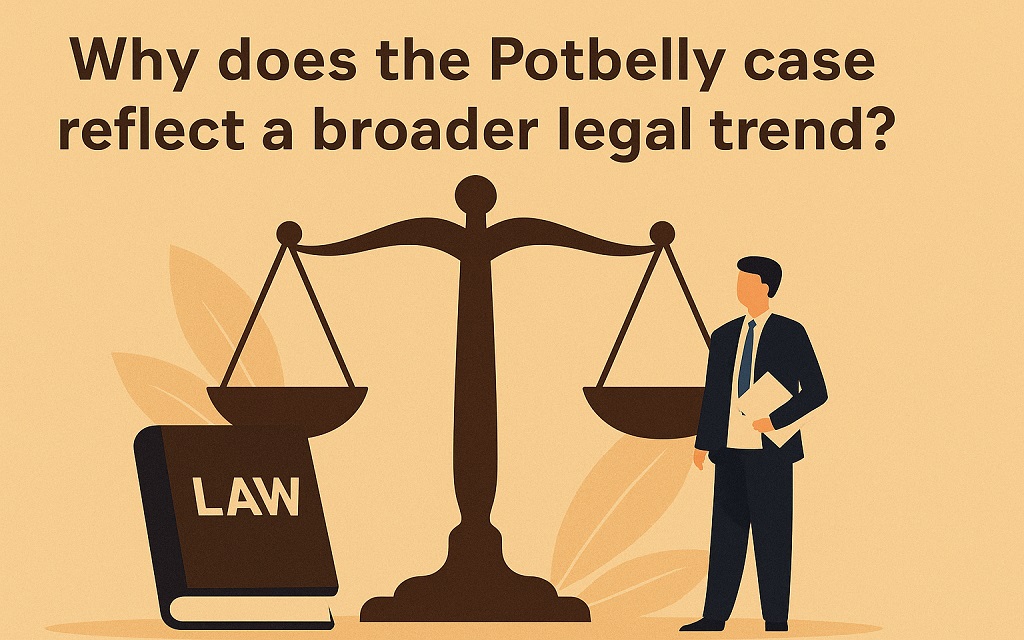
You should know that the Potbelly case is part of a much larger shift in employment law. Washington became a testing ground for pay-transparency litigation. Since RCW 49.58.110 took effect on January 1, 2023, dozens of lawsuits have been filed. Employers across industries face claims for failing to post wages and benefits.
Washington’s pay transparency requirements under the Equal Pay and Opportunities Act (EPOA) mandate that covered employers include wage scale/salary range and a description of benefits and other compensation in job ads. Recent Washington decisions have expanded who can sue under the statute, increasing compliance risk for employers and strengthening applicants’ ability to seek statutory remedies.
You should also see the national context. States such as Colorado, California, and New York now require salary ranges in postings. Colorado introduced its law in 2021. California and New York followed in 2023. Each state reported an increase in compliance disputes. Statistics from the National Women’s Law Center show that more than 20 states debated pay-transparency bills by 2024.
You should also consider the economic backdrop. Rising inflation and labor shortages made applicants more sensitive to pay information. Surveys by Indeed found that 75 percent of job seekers rank pay as the most critical factor when choosing an employer. Lawmakers responded by mandating wage disclosure to protect workers.
You should also note employer responses. Some companies argue that posting ranges limit flexibility. Others fear that competitors may use posted salaries to poach workers. Despite those concerns, courts continue to enforce transparency. The Potbelly case demonstrates that resistance does not prevent litigation.
You should see that Potbelly is not alone. Large corporations such as Amazon, Home Depot, and smaller regional firms in Washington faced similar lawsuits. Settlements in those cases ranged from hundreds of thousands to millions of dollars. The Potbelly settlement follows the same pattern.
You now recognize the broader trend. The Potbelly case reflects a shift toward transparency as a legal standard. More states will adopt similar laws. More lawsuits will follow. Employers who ignore disclosure rules risk costly settlements and damage to their reputation.
What questions do applicants often ask about the settlement?
You should know that applicants raise many common questions about the Potbelly settlement. Courts require clear notice to class members, but confusion often remains. Here are the most frequent questions and answers.
You may ask what the settlement covers. The settlement covers job applications to Potbelly Sandwich Works, LLC, and Sound Sandwich, LLC in Washington. Applications must fall between Nov 13, 2023, and the settlement date. The postings must have lacked wage scales, salary ranges, or benefits descriptions.
You may also ask how much money each person will receive. The fund is valued at up to $2.7 million. After attorney fees and administrative costs, the remainder is shared among claimants. If more applicants file, each payout will be smaller. If fewer apply, each payout will be larger. Estimates suggest payouts between $150 and $600, depending on participation.
You may ask how to file a claim. You should visit the official settlement website managed by ILYM Group. The site provides an online form and instructions. You may also request a paper form if needed. Claims must include your name, contact details, and application information. The deadline will be stated in the class notice.
You may also ask if proof of application is required. Most class actions do not require strict evidence. Administrators cross-check claims against company records. If your application appears in Potbelly’s files, verification is automatic. If not, the administrator may contact you. Screenshots or emails may help, but they are not mandatory.
You may ask what happens if you do nothing. If you do nothing, you will remain in the class, but you will not receive money. You will also lose the right to sue Potbelly separately. That outcome highlights why filing a claim is critical. Statistics from the Federal Judicial Center show that nearly 20 percent of eligible applicants in class actions lose payments by failing to act.
You now see the primary concerns. Applicants ask about coverage, payouts, deadlines, proof, and consequences of inaction. The answers show that participation is simple, but attention to deadlines is essential. If you applied for a Potbelly job in Washington, you should review the notice carefully and file on time.
How to claim (if the window reopens or for late updates)
Although the claim deadline was August 4, 2025, check the settlement website for any updates about late or supplemental distributions, address changes, or returned checks. Typical information requested on a claim form includes:
- Name, mailing address, email, phone;
- Approximate date of application;
- Position/location; and
- Confirmation that the posting lacked pay details.
Where can you read the official legal documents?
You should know that official legal documents give you the most accurate information about the Potbelly lawsuit. Courts require that filings, complaints, and notices remain available to the public. You can access these records through court dockets, settlement administrators, and official state resources.
It is essential to know the key sources. The original complaint in Jones et al. v. Potbelly Sandwich Works, LLC; Sound Sandwich, LLC was filed in the U.S. District Court for the Western District of Washington. The case number is 2:24-cv-01044. You can find this document on the federal court system called PACER. PACER requires registration and charges small fees for downloads.
You should also know that settlement documents appear on the administrator’s website. The settlement administrator, ILYM Group, posts the class notice, claim form, settlement agreement, and court orders. You should rely on this website for updates about deadlines and instructions. The notice provides clear answers about eligibility, payments, and rights.
You may also check state resources. The Washington Department of Labor & Industries (L&I) publishes guidance on RCW 49.58.110. Their website explains what job postings must include and how workers can file complaints. The department also provides fact sheets with examples of compliant postings.
You should also consider independent legal reporting. Outlets such as Bloomberg Law, Law360, and ClassAction.org track major pay-transparency lawsuits. They publish summaries, statistics, and case updates. These articles help you understand how the Potbelly case compares to other settlements.
You should note the value of reviewing multiple sources. Court dockets provide raw filings. Settlement websites provide instructions. Government sites provide background law. Legal media offer context. Together, these sources give you a complete picture of the case. Statistics from the American Bar Association show that more than 70 percent of class members rely on settlement websites rather than court filings. That pattern shows the importance of accessible online information.
You now know where to find official materials. If you want the complaint, you should use PACER. If you wish to claim instructions, you should use the ILYM Group site. So, if you’re going to understand the legal context, you should read reports from trusted outlets. Access to documents helps you confirm facts and make informed decisions about participation in the Potbelly settlement.
FAQs
Is the settlement final?
As of the last update, the court scheduled a final approval hearing for October 10, 2025. Final approval, if granted, typically follows after the hearing and any objections/appeals.
What law is involved?
RCW 49.58.110 (part of the EPOA). It requires covered employers to disclose pay ranges and benefits in job listings. Violations can carry statutory damages and fee shifting.
Does a recent court ruling change anything?
Washington’s appellate guidance in 2025 clarified that any job applicant can bring a claim under the pay transparency statute without having to show “bona fide” applicant status. Employers should assume broad standing and maintain strict compliance.
I didn’t keep a copy of the posting. What now?
Administrators often cross‑reference employer records. If your name appears in the hiring system for the relevant period/roles, that can help verify your claim.
Who is the CEO of Potbelly?
As of 2025, the President and CEO is Robert D. Wright.
How to complain about Potbelly?
You can file a complaint through Potbelly’s official website form or by calling their customer service line.
Conclusion: What Does the Potbelly Lawsuit Mean for You?
You should know that the Potbelly Lawsuit is more than a single case. It represents a turning point in how courts enforce Washington’s pay-transparency rules. The lawsuit shows that companies cannot ignore RCW 49.58.110 without facing legal action. Plaintiffs argued that job postings without pay ranges and benefits harmed applicants. The case now highlights the importance of transparent and honest job ads.
It is essential to know what this means for you. If you applied for a Potbelly position in Washington after Nov 13, 2023, you may qualify for compensation. The settlement process allows applicants to file claims and receive payments. The Potbelly Lawsuit also warns employers that compliance is not optional. Failure to disclose wages and benefits in job postings carries financial and reputational costs.
You should also see the broader impact. Pay transparency laws are spreading across the United States. Washington is leading, but states such as Colorado, California, and New York are following a similar path. The Potbelly Lawsuit proves that workers now have legal tools to demand fairness. More applicants will hold companies accountable when job ads lack wage details.
You now have a clear takeaway. The Potbelly Lawsuit reminds job seekers to carefully review postings and assert their rights when rules are ignored. It also reminds employers to follow the law or risk costly class actions. Pay transparency is no longer a choice. It is the standard.
Disclaimer: This article provides a general overview of the Potbelly lawsuit, based on publicly available information, and is intended for informational purposes only. It does not provide legal advice. You must consult a licensed attorney for any legal decisions.
About the author
David Howard writes about employment law developments and class action settlements for Washington job applicants and workers. This article is reviewed periodically for accuracy and updated when new court filings or administrator notices are posted.
Musarat Bano is a content writer for JudicialOcean.com who covers lawsuits, legal news, and general legal topics. Her work focuses on research-based, informational content developed from publicly available sources and is intended to support public awareness. She does not provide legal advice or professional legal services.

